#Slađana milošević
Explore tagged Tumblr posts
Text
jer ti si princeza nekog drugog sveta tvoja reč stvara čuda, budi iskrena uputi mi osmeh tek da znam postojiš, nisam sam, negde izvan planeta
#Princeza#Dado topić#Slađana milošević#Tekst#Pesma#tekst pesme#tekstovi pesama#najlepsi tekstovi#najlepse pesme#beloggradacrnaprinceza
14 notes
·
View notes
Text
Stefan Simić: SLAĐANA MILOŠEVIĆ - SLAVA I BOL
Na ovim prostorima malo ko je shvaćen na duže staze ozbiljno I za mnoge traješ koliko ti traju mladost i lepota Posebno žene koje su kao vrlo mlade postale dive Da kada nas napuste, ne znamo za kim žalimo, da li za onom Slađanom Milošević koja je sa Dadom Topićem pevala “Ti si princeza”, možda i najveći ex-yu duet, ili za Slađanom iz poslednje faze Kada joj je bilo preko glave svega A nije htela…
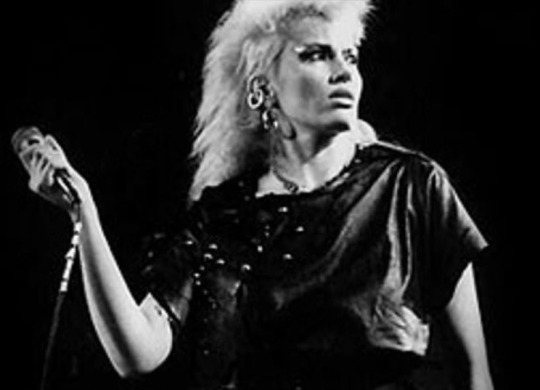
View On WordPress
0 notes
Text
slađana milošević was so gorgeous in the 80s it's... ma'am...
2 notes
·
View notes
Text

Slađana Milošević - Two Of A Kind
1 note
·
View note
Text
YU rok misija
YU rok misija bio je sastav od izvođača nekadašnje SFRJ, koji su, snimivši pesmu „Za milion godina“, uputili podršku Bobu Geldofu, koji se borio za ljudska prava u Africi, a čija je akcija kulminirala koncertom „Live Aid“ 13. jula 1985.
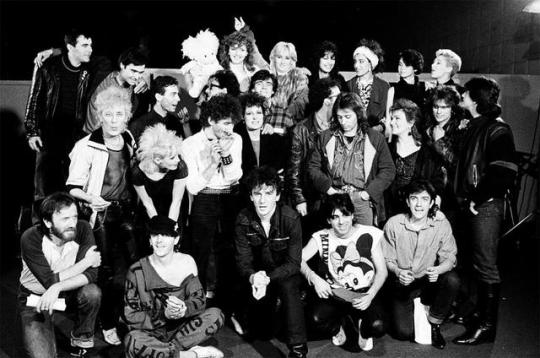

Elita jugoslovenske rok i pop muzičke scene zajedno je formirala jugoslovenski "Aid" bend, nazvan YU Rock Misija. Grupa je snimila pesmu i odgovarajući spot. Grupa je uključivala izvođače kao što su Oliver Mandić; Željko Bebek, bivši pevač rok grupe Bijelo Dugme; Marina Perazić, iz dua grupe Denis i Denis; Momčilo Bajagić-Bajaga, frontmena benda Bajaga i Instruktori; Aki Rahimovski, frontmena benda Parni Valjak; Slađana Milošević; Dado Topić; Masimo Savić; Zdravko Čolić; Jura Stublić; Peđa D' Boy i mnogi drugi poznati muzičari. Snimili su singl "Za milion godina", koja je i dalje jedan od evergrin hitova na prostorima bivše Jugoslavije. U ovoj pesmi, gitaru je solo svirao Vlatko Stefanovski iz benda Leb i sol. Bora Đorđević, vođa sastava Riblja čorba i Goran Bregović iz Bijelog dugmeta nisu navedeni na zadnjem omotu ploče, ali su učestvovali u televizijskom izvođenju pjesme.


Za kraj kampanje, jugoslovenski muzičari su izveli ovu numeru na osmočasovnom koncertu 15. juna 1985. u Beogradu. Spot za ovu pesmu prikazan je na mnogim televizijskim stanicama širom sveta, a 13. jula1985. je prikazan u okviru „Live Aid“ koncerta u Londonu, na velikom video-screenu. Ovaj spot je takođe uključen u „Live Aid DVD“ izdanje, koje je izdato 2004. godine.


#yu rok misija#yu rock misija#ex yu rock#yu rock#exyurock#jugoslavija#zdravko čolić#massimo savić#željko bebek#marina perazić#bajaga#aki rahimovski#slađana milošević#jura stublić#peđa d'boy#za milion godina#oliver mandić#vlatko stefanovski#bora đorđević#goran bregović#live aid
94 notes
·
View notes
Text
SLAĐANA MILOŠEVIĆ
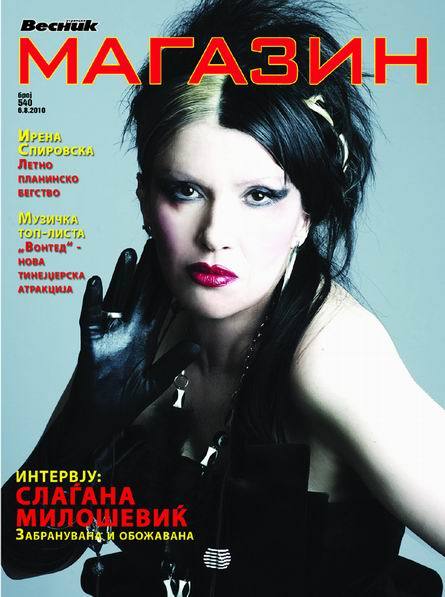

Alexandra Sladjana Milosevic on the cover of magazine ”LIFE”, 2010
Alexandra Sladjana Milosevic Hagadone
Alexandra Sladjana Milosevic Hagadone was born in Belgrade, Yugoslavia. Her talent for music became very apparent at the early age, so she started education in classical music at the age of five, playing piano. Few years later, her interest turned to studying violin. At the age of twelve she became a singer and a bass-guitarist in a rock and roll school band, though she had not given up violin playing. She recorded a first single at the age of fifteen, playing violin and singing Indian influenced music with a group “Ganesha”.
From then on, her interests had shifted towards various artistic expressions such as acting, playing music and dancing in the fringe theatres and experimental movies. She acted in Belgrade’s “Ex Art” Theatre, “Atelje 212” Theatre and in “Academic Kino Club Krsmanovic”. As a violinist, a member of "Belgrade Radio - Television Orchestra", her career continued doing studio work. Nevertheless, playing in a big orchestra appeared to be an obstacle for a further creative development, so she decided to proceed as a soloist. She had won her first prize at “Maglaj Youth Festival” in 1974.
In 1976, she toured the former Soviet Union as a soloist in “Sasha Subota Orchestra”, where she had recorded a “Compilation of World Hits” LP and a single "Mikado" for Soviet label “Melodia”. Besides extensive touring with hundreds of concerts performed throughout former Soviet Union, she took part in numerous TV shows. One of the highlights was her interpretation of Marina Cvetaieva’s poem “I Like it When You Are Yearning for Me”, sung in Russian on Moscow TV, in a special birthday greeting for Soviet Union’s President Leonid Brezniew.

Being in constant discordance with restrictive regime and the media, despite all the efforts, she could not release a solo record in her homeland Yugoslavia for many years. Thus, she invests her funds and finally manages to produce and release the first single in 1977. Unexpectedly, it had achieved an immediate success hitting no. one on the charts. Alexandra S. Milosevic's provocative first song “Au, Au” caused controversial reactions.
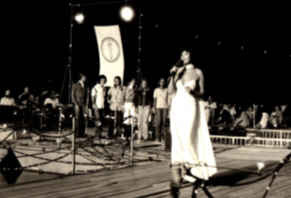
Belgrade debut, 1977
However, her creative potential, persistence and consistence of ideas had won over. She stimulated and influenced younger musicians and other less courageous, to follow her path.

1978
From then on, every song she had released hit the top of the charts: “Au, Au”(1977), “Sympathy”(1978), “Sexy Lady” (1978), then “Amsterdam”, and “Obviously I'm not Indifferent”, off of an “Anxious to Waste the Night Away” LP (1979). Alexandra’s fame spread throughout the entire region and the surrounding countries. At midnight, Hungarian audience celebrated with Alexandra an arrival of the New Year 1979, through her one hour performance on National TV, Budapest.
Alexandra represented TV Belgrade on a “Eurovision Song Contest” in 1981, with a song “Recipe for Love”.

Alexandra’s band in 1981
In 1982, as a Special guest, she embarked with her band on a national Yugoslav tour with English rockabilly legends the “Matchbox”.
In 1983. she started a band “Neutral Design” in Munich, Germany and released a self - titled album. Musicians who took part in this project collaborated with stars and bands known worldwide such as: “Santana”, “Nina Hagen Band”, “Splif” etc. Songs off of this LP were broadcasted and sold in West Germany, Sweden, Yugoslavia and other European countries. A single “Das Licht von Kairo / Miki, Miki” released in Yugoslavia, became a mega hit.
At “Opatia Festival 1984.” Alexandra S. Milosevic won a “Special Award for Interpretation” for the composition “Samsara”. Another great success followed, with Maxi-single “Princess”, a duet with Dado Topic, which premiered at the “Eurovision Song Contest” in 1984. In the summer of that year, Alexandra filmed a 24 minutes animated show “The Girl in a World of Chips”, for Bosnian TV, Sarajevo. The show was awarded a Plaquette at the international “Montreux TV Festival”. It also took “The Best Yugoslav TV Show of the Year” award on national “Struga TV Competition”.

1983
Alexandra had continued cooperation with her colleagues abroad and moved to London to work with the likes of Alan Darby (“Fashion”, ex-“Cockney Rebel”), Russell Bell (“Gary Newman Band”) and Peter Godwin (David Bowie's songwriter). She also did music for commercials for BBC 1 Advertising Department. As a composer and arranger she contributed in the making of Alan Darby's LP, released in Great Britain in 1985, on CBS Records.

“Sexy Lady”’ photographed in 1998.
She took part in the “U.S.E. Project” (‘United States of Europe’ song performed by Alan Darby, author Midge Ure of “Ultravox”), recorded in Stevie Wonder’s studios in Paris where she took a role of a vocal producer assistant.
In 1985, composition “Princess” was awarded a “Grand Prize” at “Mesam International Festival” Belgrade, Yugoslavia, winning “Song of the Year” title.
She supported organization of Yu Live-Aid (International movement for hunger relief in Africa, originated by Bob Geldoff UK) and took part in a song dedicated to the cause, titled “In a Million Years” (1986). Next success, composition “Fantastic Journey”, was performed on “Mesam International Festival” 1986. Belgrade, Yugoslavia. Soon after, Italian National Television with producer Gian Luigi Morgia, filmed Alexandra’s 20 minutes show for RAI 2 TV channel.
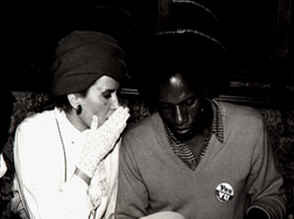
Alexandra and Eddie Grant in 1986
In 1988, Alexandra did a successful remake of a song “First Snow” at the author’s (Dr. Spira - Dusan Mihajlovic) request.
Album “Alexandra Sladjana Milosevic & Darko Kraljic’ with mellow jazz ballads, (an exception to her rock style), was recorded in 1987. That same year, a song off of the album “Without Hope” won “Grand Prize” at “Mesam International Festival” in Belgrade, Yugoslavia.
During her career, Alexandra performed title songs for several movies: “Crazy Years”, “National Class” and for few documentary movies. Frequently she had been a guest vocalist and a guitarist on other musician’s albums such as: Dado Topic, “Leb i Sol”, Goran Milosevic (Alexandra`s brother, star singer, ex “Generation 5”), “Nityananda”, “Yu-group” and others.
She took part in numerous humanitarian projects. She was the originator and the executive producer of the Charity Festival “United Yu-Rock Forces”, organized for the benefit of paraplegics, in Belgrade 1988. “Belgrade Paraplegic Organization” nominated her an “Honorable Member” for the support she had given to the cause.

“Kosovo Charity Ball” contestants, Los Angeles 1995
Thus far, doing concerts she had moved through hundreds of USSR cities, from the Polar region of Murmansk to the south of the Island of Crim. From Niagara Falls through Chicago, Cleveland, Mississippi, New York to Los Angeles and many other cities in the USA, West Germany, Hungary, Greece, China, Canada and the entire former Yugoslavia.
In 1988, she joined the group of young classical composers from “Belgrade Conservatorium” recording and performing new classical artistic music.
In 1989, composition “Toccata” by Igor Gostuski with Alexandra’s vocal interpretation, had won two first prizes at the “Experimental Classical Music Contest” in Opatia and Munich.
That same year, Alexandra Sladjana Milosevic was invited to take part in the “Invitational Contest of International Friendly Cities Singers Meeting in Beijing”, China. She had won a "Special Honorary Award" for an overall two-part competition that included interpretation of a traditional Chinese song and her original music. In a free form competition she had won a “Silver Cup Award”. Since she was so well received by Chinese audience, for whom this was one of the first encounters with western music, she was invited to perform in various concert-venues and television shows.

China - Beijing competition, 1987
The success of the first tour in China resulted in yet another invitation in 1989, when she performed a number of concerts and TV shows including a concert at the famous Pierre Cardin’s “Maxim’s”.
Chinese “Hundred Flowers Records” signed and compiled Alexandra’s hit songs for their market in 1989.
Upon returning to Europe she co hosted a TV periodical titled “Cultural Bridge Beijing-Belgrade”, produced by TV Belgrade, Yugoslavia. Further on, she continued to contribute in maintaining and developing cultural relations between China and Yugoslavia.
In 1989, she joined “Baby Sister”, headlining band on Sunset strip rock club scene in Los Angeles, California. A contract with a legendary American manager Richard Papasian (“Steppenwolf”, “Journey”, “Montrose”) and his production - management company “Artists at Work” was soon signed.
After completing short tours in Yugoslavia and Switzerland she worked on a new demo - material in London.
In 1990, she continued working on her album with American recording and production team in Los Angeles that included major American celebrities, such as “Guns'n'Roses`s” songwriter West Arkeen, Lary Wilkens (“Little Feat”), Jeff Buckley, Derek Davies (“Babylon A.D.”, author of the title track for “Robocop 3”), John Buxter with whom she did music for a Canadian CD-Rom production company.

USA TV “Carol Vitale Show”, 1994
In the meanwhile she worked on improving her guitar skills, studying with Hollywood’s MIT reputable instructors: Scott Henderson (Chick Corea, Joe Zawinul, “Tribal Tech”), Bruce Bouillet (“Racer X”- with Paul Gilbert), Scott Van Zen (“KISS” collaborator), James Hagadone and others. During that time she appeared on American TV shows and live scene.
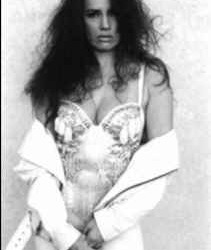
Los Angeles, 1994
Besides furthering her musical career, she enrolled in a Business school and specialized in the investment field, becoming a stockbroker. In this position she worked in film industry (“Renegade Film Productions”), digital communications (“Digital Communications Inc.”), interactive multimedia industry and projects in developing new computer technologies.
After connecting with Tania Delic's “International Trust Peace Fund”, which enabled continuation of her musical endeavors, she visited Yugoslavia in 1995.
She recorded five new songs among which “Times are Changing” a collaboration with American author Derek Davis (“Babylon A.D.”). She scripted and directed an animated video clip for “Times are Changing” in 1995. The following 1996, she and her brother Goran Milosevic, recorded a duet “One must forgive” (also released on Goran’s album). Alexandra continued appearing in numerous TV shows and live performances in Yugoslavia and Europe.
In 1997, she started working on a material for the new album. During that period she visited China twice, where in Beijing she had directed a video clip for a title song “Harmony” for the album soon to be released. A video was a symbolic tale of man’s discordance with nature, which poses a treat to his existence. In spring of 1998, CD “Harmony - Compilation of Ballads vol. 1” was promoted in the artificial garden of Paradise, Alexandra designed for that purpose.
When Serbia and Belgrade were bombed by NATO in spring of 1999, Alexandra and her brother recorded and shot a video clip for “No More Tears”, a song they wrote together. It was an emotional call against violence and the sadness it consequently causes. Finish singer Ianne Hurme recorded this song for Finish market, where it reached a considerable success.
The first video clip off of the album “Animal Tested” soon to be released, Alexandra scripted and directed in December of 1999. It was a controversial “Legalize Freedom”, which was, due to the rules of the repressive political regime, immediately banned on almost all TV stations in Yugoslavia.
On the 13th of January 2000, a Serbian Christian New Years celebration day, Alexandra delivered the award to the “Most Resisting Media Reporter”, political prisoner at the time. The celebration - protest was organized by “Otpor” (Yugoslav Youth Resistance) at the main Belgrade’s town square.
During the protests against the authoritarian political regime of, at the time Serbian President Slobodan Milosevic, Alexandra Sladjana Milosevic took an active role.
Later that year, over 100 000 people were present on Belgrade's Republic Square during the Democratic Opposition gatherings organized by NGO “G 17+”, when Alexandra took stage to play a set with her band. She joined the efforts of the people of Serbia in their strife for freedom and request for the new government.
She also took part in “Vreme je” (The Time has Come) project conceptualized by “ANEM” (Association of Independent Media) and “G17 +”. She sang and played the song in support of the awakening of the democratic awareness in Serbia and the first free elections. She had played concerts on public squares during the entire democratic campaign and spoke on the media in favor of it.
After speaking at a Press Conference in Belgrade’s Media Center in July 2000 with Mladjan Dinkic, one of “G17+” leaders (former Treasurer in Djindjic’s Government, Minister of Finance of Serbia in 2004), she was arrested in her residence. There was neither explanation nor there were any charges brought up. After questioning, she was let free. Radio / TV “Voice of America” soon reported about this harassment, which has continued for Alexandra for some time.
In the year 2000, Alexandra’s album “Animal Tested” got released in Great Britain for “Wastelands Unlimited” Record Label. Alexandra commented: “This album of mine is created to challenge stupidity and backwardness, and is a voice against all-out manipulation.”
The second clip off of the album “My Cross is Bleeding”, was also self written and directed in summer 2000.
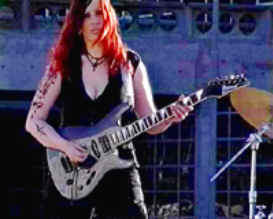
“My Cross is Bleeding” video clip frame, 1999
In October 2000, Alexandra was a panelist at the Symposium “Cultural Politics and Development of Serbia” in “Sava Centar”, Belgrade, organized by the “Center for Contemporary Arts”, where she presented the “Plan for the Reform and Restructuring of Yugoslav Music Industry”. It was her, both by experts and the media, well received debut into official politics.
Alexandra Sladjana M.H. addressed the crowd of approximately one million people from the City Hall balcony on the 5th of October 2000, while the final overthrow of Milosevic was taking place. She, and few of her colleagues, actors and politicians, kept the crowds awake during that historical night when Slobodan Milosevic and the members of his regime finally stepped down.

Protests, during 2000
In autumn 2000, she directed a video clip “Ko ce reci ljudima” (Who will Tell the People) the third single off of the “Animal Tested” CD.
Due to her efforts in bringing new solutions to the disorganized music industry, “Ministry of Culture of the Republic of Serbia” appointed Alexandra Sladjana Milosevic a “Coordinator of the Reform of Music Industry in Yugoslavia” in March 2001.
RTS Radio “Program 202” produced 8 episodes of a one hour weekly radio show she wrote and hosted, titled “Animal Tested”.
Alexandra Sladjana M.H. first literary achievement (with co-author Dr. Jasmina Malesevic) “Adam Don't Get Mad”, was published and released by “Draslar Partner”, on the 4th of September 2001.
As a director and a screenwriter, Alexandra S.M. promoted the book, putting up an outdoor theatrical performance in Belgrade’s Knez Mihailova Street. One of the critic’s highlights of the book “Adam Don't Get Mad” is the commentary made by one of the world most famous living authors
Paulo Coelho: “When I first met Alexandra in ‘97, I was struck by the boldness and originality of her self-expression. Then I spoke to her and quickly noticed her acumen and sharp wit. Over the years we've kept in touch. I've learned that Alexandra is not only a versatile and eclectic person, but a highly resourceful individual as well. She has something that I've always admired in people: a heart to dream and courage to make her dreams come true. I hope that this book will just be the beginning of a long and rewarding writing career”.

Alexandra as Lilit for “Adam Don't Get Mad” cover
In the year 2002, Alexandra’s record label PGP - RTS, released the greatest hits compilation “Metamorphosis”, a triple CD box set. The compilation was to celebrate her 25 Years Jubilee. Alexandra also shot “Metamorphosis”, one hour TV show, for the national TV RTS.

From “Metamorphosis” TV show
In November of the same year, PGP - RTS signed the distribution of “Animal Tested” CD for Yugoslav market.
Alexandra wrote and directed a documentary titled “Music Industry of America” for TV RTS in 2002. Material was filmed in Los Angeles, USA. It was a five episode - serial, shown on national TV RTS in the summer of 2003. In a thirty minutes form, each episode covered the most significant issues that Alexandra tackled in her Reform of the Music Industry Plan, such as record labels role, songwriting, producing, union matters, copyrights, piracy, music in movies and the musicians place in corporate business. The first episode titled “Sheep Culture”, featured Don Grierson, long time A&R Director of Sony / Epic and EMI.
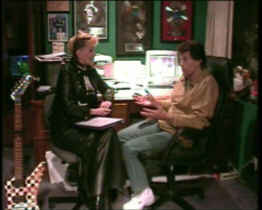
Alexandra and Don Grierson
The second episode “Richman and the Poorman” featured producer Peter Rafelson, (best known for composing “Open your Heart”, Madonna’s hit single). The third, titled “Who Lobbies for you?” featured panelists from the “American Federation of Musicians”. The fourth “Sex and a Bit of a Sin” was filmed on a movie set of an indie movie “A Day in a Girls Life” (staring James Woods in a leading role). “Jealousy of Gods”, the fifth episode covered the role of managers / agents and the musician’s view of the music industry. It featured one of the latest shows of “Great White”.
The serial had generated significant public interest and media coverage. Its primary goal was to inform Serbian general as well as professional audience of the complex matters concerning global and local music industry.
Video clip “Uniform”, she filmed and directed in Los Angeles in autumn of 2002.
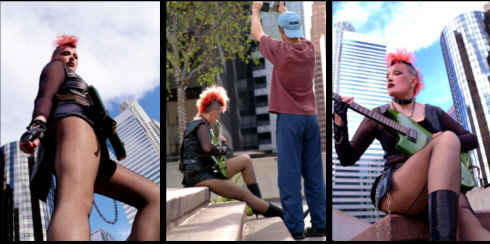
Shooting of “Uniform”
Most part of 2003. Alexandra had dedicated to upgrading her academic education at the USA Santa Monica College, in her Los Angeles home.

Photo shoot in 2003
In continuation to her previous engagements on the reform of the music industry, betterment of the musician’s role in Serbian society, promotion of changes in cultural and legal surrounding, she had founded Ars et Norma Association on April 20th 2004. (site address: www.arsetnorma.com, e-mail address: [email protected]) and is its elected President. The organization’s program is directed towards raising awareness of issues of intellectual property / copyrights. Association’s projects include educational programs for legal experts, artists and general public; creation of regional and global network with related organizations; as well as developing projects directed to the improvement of cultural ambience.
Alexandra’s efforts are directed towards producing a charity manifestation “Pod zlatnim suncem Srbije” (Under the Golden Sun of Serbia), that includes a concert, auction, panel discussions, Christian icons exhibition and other cultural events. She and her brother Goran will soon be recording “Under the Golden Sun of Serbia” manifestation’s title song. (read more on www.arsetnorma.com, projects)
Association’s objectives are to preserve Serbian cultural heritage and project its contents into the future. Such is the program Under the Golden Sun of Serbia whose sole purpose is to help create a vision of further national cultural development.
Association “Ars et Norma” has completed many projects such as a “Campaign for the Better World” project, funded by the United States Embassy in Belgrade.
It was a national campaign that had directed public and expert’s attention to the issues of copyright laws, creating the environment that enabled needed changes to be implemented into Serbian society and its regulatory system.
Anti - piracy national “Campaign for the Better World” was primarily directed to the general public, increasing public awareness of the IPR issues.
A “band aid” song and a video clip titled “8th and the 10th Commandment” was produced by Ars et Norma with known artists, musicians, actors, film and TV directors participation(more on www.arsetnorma.com, projects)”.
In 2004. Alexandra wrote and produced a 5 episode TV serial titled “Legalize Art” for Serbian Art TV, with support of American Embassy in Belgrade and Ministry of Culture of Serbia.
For 11 years, starting with the year 2000. Alexandra has been holding a teaching position at “Pragma” PR School in Belgrade, Serbia where she educates students in Personal PR strategies and techniques.
In January 2007. Alexandra Milosevic – Hagadone documentary film „Nikola Tesla - Inventions“ was translated into English and French with a title „Nikola Tesla – Les Inventions“. French version of a film premiered on January 19th 2007, in an exhibition titled “Tesla’s Remarkable World of Electricity” at the “Serbian Cultural Center” in Paris, France. Film „Nikola Tesla - Inventions“ had many screening in Serbia and Europe (in 2006. in autumn session it was shown at the Parliamentary Council of Europe in Strasbourg, France). It is currently showing at “Nikola Tesla’s Museum Belgrade”.
On the 13th of February 2007. at the Ministry of Diaspora of the Republic of Serbia Alexandra Sladjana Milosevic was granted a prestigious Government Award GOLDEN TOKEN and a Charter, delivered by the Cultural Union of Serbia („KULTURNO PROSVETNA ZAJEDNICA SRBIJE“) in collaboration and support of the Ministry of Diaspora of the Republic of Serbia. The Award was granted to her for a long term contribution to cultural development of Serbia.
In January 2008. one of Alexandra’s poems "Pitanje ropstva" (The Matter of Slavery) was translated into English and released in Swedish anthology "Alla skall skriva poesi 3".
In May 2008. a double compilation of Sladjana's 20 songs and 20 videos, titled "Fantastic Journey - 30 Years" was promoted.
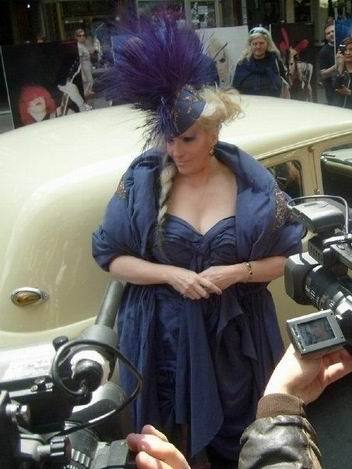
Sladjana at her "Fantastic Journey" promotion
In June, July, August, September 2008. Alexandra Sladjana Milosevic had signed a record deal in the USA for Fearless Music Entertainment Group led by Mr. Boro Vukadinovic and reputable music industry wizard Mr. Don Grierson http://www.dongrierson.com/site02/biography.html. A record will be released after Miss Alexandra completes her studio work.
In March 2010. TV BHRT - Television of Bosnia and Herzegovina, Sarajevo, shot and broadcast Alexandra Sladjana Milosevic's half an hour live show, in show program titled "Kod kuce je najbolje". Alexandra Sladjana performed her hit songs and in a lengthy interview, reminded viewers of her versatile artistic work.

Sladjana performing "Miki, Miki", March 2010, TV Sarajevo
In May 2010. TV show "Sladjana&Dado Live" was broadcast on RTS (National Television of Serbia). Sladjana played with her band a half an hour show and performed legendary duet "Princess" with Dado Topic.
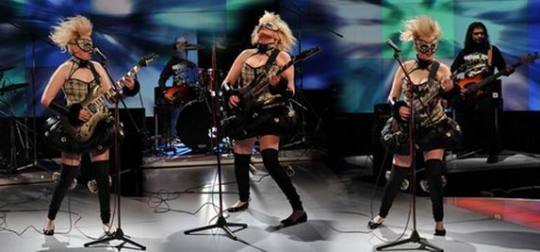
Alexandra Sladjana performing "Neko je tu", RTS show, May 2010
In June 2010. duet Sladjana&Dado - Alexandra Sladjana Milosevic and Dado Topic had won the first award at "Pjesma Mediterana" (“Mediterranean Song”) festival in Budva, Montenegro. Lyrics for a winning ballad "Kad reci zastanu” (“When the Words Stop”) were written by Alexandra.
During 2010. Alexandra Sladjana Milosevic was a columnist for Serbian newspaper PRAVDA Her column was titled “LEGALIZE FREEDOM” and appeared bimonthly. In specific critical, yet constructive way, she tackled social, economic and cultural topics. Column titles were “Talking about Justice”, “The Kitsch Planet of Serbia”, “Monopoly on Reality”, “Conflict of Interest”, "Depolitization of Culture”, “Fallen 5th October Revolutionary" and "Euro Zone on Fire" .
In Sept/October 2010. EUROPOPMUSIC, a web portal dedicated to the finest and the best artists of Europe, based in Holland had chosen Aleksandra Sladjana Milosevic to be the Artist of the Month. EUROPOPMUSIC editors had created Alexandra’s profile and regarded her as the artist before her time, recognizing her authenticity, placing her before Lady Gaga and similar artists that followed the Alexandra’s path. Her profile describes her as an innovator who confronts hypocrisy and other malice of society, a visionary who projects a different world. They point out her fight against piracy and copyright infringement. EUROPOPMUSIC had translated Alexandra’s interview for Macedonian magazine „Utrenje“. http://www.europopmusic.eu/Newsletters/Profiles_news/News2010_2.html#Artist_september2010
Alexandra’s education in psychology was upgraded by her completing higher levels of Transactional Analysis Psychotherapy at the TA Institute of Novi Sad, Serbia. In 2010, she had become a “Practitioner of Transactional Analysis”.
On the 20th of September, 2012, Alexandra's 11 years long effort, a book titled “CIVILIZATION AND A WOMAN - MANLY WOMAN", Vol. I and II had its promotion in her native city of Belgrade, Serbia. The promotion was held at King Peter's House in the presence of renowned scientists, writers, artists and other distinguished guests. There was significant media coverage of the event and the book in Serbian media.

"CIVILIZATION AND A WOMAN - MANLY WOMAN" represents a combination of author’s authentic and encyclopedic literary work, written on 1732 pages, vol. I & II in textbook format. Author’s research and personal interests were the fields of psychology, mythology, religion, history, philosophy, sociology, art, anthropology, and ethnology, as well as other similar scientific disciplines. Civilization and a Woman – Manly Woman chronologically portrays woman’s fate through the several thousand years long history, beginning with the ancient civilizations of Mesopotamia, Egypt, Judea, Greece, Rome, and Byzantium, through the Middle and New Ages, to the Modern and the Postmodern Period. The author unveils women’s social role, personal achievements, exponential psychological and creative advancement and the woman’s true nature, through myths, religion, art, philosophy and science.
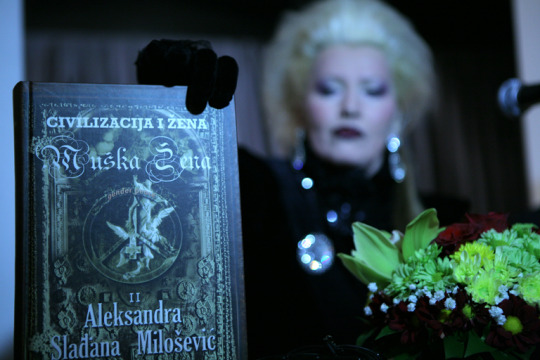
Alexandra Sladjana Milosevic with her book
Alexandra S.M.H. appears on her records as a singer-songwriter, arranger, producer, guitarist (electric and acoustic, both rhythm and lead), violinist, bass player, keyboard player and percussionist.
She took part in over 1500 TV and numerous radio shows, shot, scripted and directed video clips and other TV forms. She occasionally writes articles for various magazines and book commentaries. Besides Serbia and Montenegro, and former Yugoslavia, she took part in concerts, TV and radio performances in China, Soviet Union, Germany, Greece, Italy, Hungary, USA and Canada. There are about 3000 magazine and newspaper articles and approximately 300 magazine covers of her already.
Although frequently in collision with the establishment for preceding the ongoing tendencies, she is a recipient of many honors and awards. In her long career she supported and promoted young talents and opened areas for new, progressive artistic expression. Her name can be found in several encyclopedias. Her hit songs became evergreens.
Her hobbies are painting and taking care of animals.
Currently she is engaged in several projects, one of which is preparing songs for a new album; she is also working on three books simultaneously: “Civilization and a Woman”, ”Pain my Natural State” and “Mechanical Priestess”.
#Slađana Milošević#Alexandra Sladjana Milosevic Hagadone#Alexandra Sladjana Milosevic#Sladjana Milosevic#Слађана Милошевић#Слађана#Милошевић#Slađana#Milošević
1 note
·
View note
Text
Napile se ulice - Bijelo dugme
Ne zovi, mama, doktora - Prljavo kazalište
Kad hodaš - Riblja čorba
Voli te tvoja zver - Divlji anđeli
Igra rokenrol cela Jugoslavija - Električni orgazam
Sjećam se prvog poljupca - Film
Ratne igre - Kerber
Sa druge strane jastuka - Bajaga i instruktori
Apsolutno tvoj - Mirzino jato
Esma - Bijelo dugme
Jabuke i vino - Zana i Željko Bebek
Ima nešto od srca do srca - Crvena jabuka
Princeza - Slađana Milošević i Dado Topić
Vojna pošta - Zana
Samo sklopi okice - Valentino
Tamara - Boris Novković
Kad zamirišu jorgovani - Vesna Zmijanac Dino Merlin
⭐osamdesete⭐
19 notes
·
View notes
Text









Slađana Milošević & Dado Topić // Princeza
Jer ti si princeza nekog drugog sveta
Tvoja rec stvara cuda, budi iskrena
Uputi mi osmeh tek da znam
Postojis, nisam sam, negde izvan planeta
10 notes
·
View notes
Text
moju ličnost najbolje opisuje činjenica da mi je selebriti kraš, između ostalih, bila i slađana milošević
2 notes
·
View notes
Photo

Slađana Milošević - Neutral Design (1983) album cover
0 notes
Photo
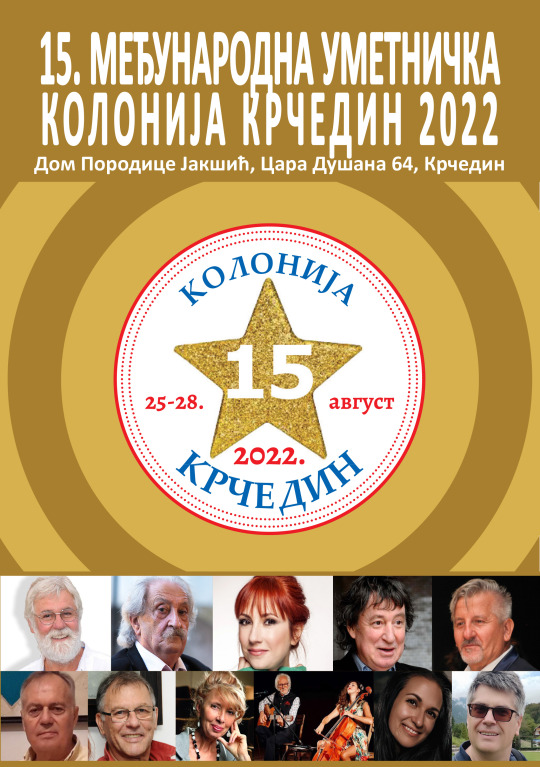
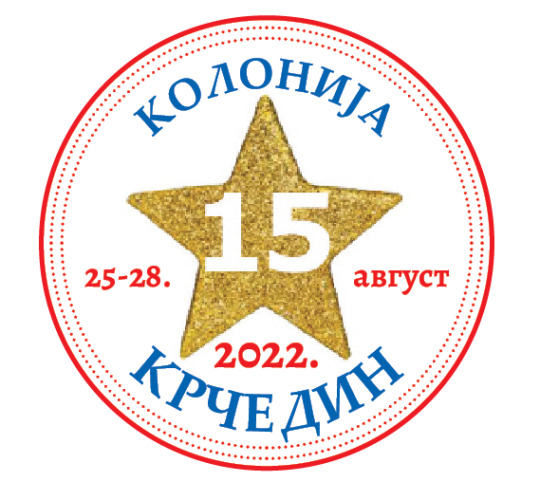
JUBILARNA PETNAESTA MEĐUNARODNA UMETNIČKA KOLONIJA KRČEDIN 2022.
PERO ZUBAC OTKRIVA BISTU MIKE ANTIĆA, TITULE „JA, KRČEDINAC“ PAULINI MANOV, MIĆI TRNAVCU, ZORANU DAŠIĆU DAŠI I NEBOJŠI KUZMANOVIĆU, A DUO MODERATO KAO POSLASTICA UZ VIŠE OD 60 SLIKARA
Ovogodišnje veliko umetničko okupljanje, jubilarna 15. međunarodna umetnička kolonija u Krčedinu, biće održana od četvrtka 25. do nedelje 28. avgusta, u Domu porodice Jakšić u Krčedinu, ulica Cara Dušana broj 64.
Tradicionalnu koloniju će, u četvrtak 25. avgusta u 20 sati, u Domu porodice Jakšić u Krčedinu, (Cara Dušana 64), otvoriti jedan od najveći srpskih pesnika Pero Zubac, koji će prethodno u Domu Jakšića otkriti i bistu velikanu srpske književnosti Miki Antiću. U svečanom otvaranju učestvovaće i predsednik opštine Inđija Vladimir Gak i dobitnici Jubilarne zlatne medalje Kolonije Krčedin - slikari Dragan Stojkov i Janoš Mesaroš, književnik Aleksandar Čotrić, glumac Milenko Pavlov i kantautor Vojislav Mehandžić. Popularnoj srpskoj glumici Paulini Manov, publicisti i direktoru Arhiva Vojvodine Nebojši Kuzmanoviću, muzičaru i vođi sastava „Legende“ Zoranu Dašiću Daši i slikaru Radovanu Mići Trnavcu, biće dodeljene tradicionalne titule „Ja, Krčedinac“, koje su do sada, među ostalima, dobili, Raša Popov, Brana Crnčević, Bora Đorđević, Matija Bećković, Pero Zubac, Ivan Bekjarev, Slobodan Rakitić, Bane Krstić, Minja Subota, Marko Nikolić, Milovan Vitezović, Bilja Krstić, Milutin Dedić, Slađana Milošević, Janoš Mesaroš, Dragan Stojkov, Rada Đuričin, Milenko Pavlov, Vanja Bulić, Bruno Langer, Gojko Đogo, Vico Dardić i drugi.
U bogatom programu Kolonije, na scenama „Bora Đorđević“ i „Arte“, pored navedenih umetnika u muzičkom delu učestvovaće i Duo Moderato, rok grupa „Živa istina“ i brojni solisti. Nastupiće i veliki broj književnika, među kojima Dušica Ivanović, Jelena Ćirić, Aleksandra Radaković, Predrag i Miodrag Jakšić, Mitar Đerić Laki, Nenad Vučetić, Ilija Šaula, Gordana Vlajić i mnogi drugi. Premijerno će biti izveden muzičko-dramski prikaz „Đura Jakšić, Laza Kostić i Svetozar Miletić – Slava Srbinu!“
Tokom pet dana na obroncima Fruške gore, slikaće i vajaće, 62 umetnika iz 12 država, medju kojima i Stojan Milanov, Milan Ignjatović, Maja Volk, Nenad Stojkov, Ivan Karafilovski, Sofija Ječina, Miki Kršanin, Dorota Krauze, Dana Petkov, Zdravko Červ, Mariana i Krasimir Georgiev, Almedina Cifrić, Ivana Vukajlović Simić, Bojana Vrhovac, Siniša Popov, Jelena Bodrožić, Ivana Bukurecki, Anđela Đermanović, Jasmina Trifunović, Roman Planko i drugi.
Jubilarne zlatne medalje Kolonije Krčedin biće uručene i urednici RTV Sofiji Ljukovčan i novinarki Anđelki Mali, arhitekti i muralisti Andreju Josifovskom Pijanisti, umetničkom paru Georgijev iz Sofije, Opštini Inđija, Predstavništvu Republike Srpske u Srbiji, kompanijama Zlatiborac, Baltazar i Medijus, te Udruženju umetnika Nova Pazova i Udruženju likovnih umetnika Inđije.
U Domu Jakšića u Krčedinu biće otvorena spomen soba – legat Mihajla Todorovića Kepe, legende beogradskog pozorišta „Boško Buha“.
U pratećem programu Kolonije biće otvorena izložba slika pod nazivom „Žena kao motiv“ više autora, izložba skulptura Miroljuba Mikija Kršanina, ambijentalna izložba slika Ilije Šaule i izložba slika i skulptura „Žiri nad gradom“ Aleksandre Radaković.
Selektor slikarskog saziva i urednik programa je književnik Miodrag Mića Jakšić.
Kao i svake godine organizatori Kolonije pokazaće društveno odgovorni i humani karakter manifestacije, uključujući se u program „Čep za hendikep“, za nabavku invalidskih kolica osobama sa hendikepom, a organizatorima ove humanitarne akcije biće uručen velika količina čepova.
Kolonija se održava pod pokroviteljstvom Opštine Inđija, a u organizaciji udruženja „Moj Srem“ iz Krčedina i Umetničke grupe „Arte“.
#kolonija#krčedin#kolonijakrčedin#umetnost#književnost#opštinainđija#indjija#fruškagora#mojsrem#krčedinac#miodragmicajaksic#perozubac#duomoderato#umetnickakolonija#slikari
0 notes
Text
Aleksandra Slašana Milošević - Odlazak Princeze
Fotografija Svijet, Zagreb 1988. Piše: Sandy Uran (Novi list) U 69 godini nakon kratke bolesti u Zemunu je preminula pjevačica Slađana Milošević, ikona novog vala osamdesetih u nekadašnjoj bivšoj državi. Mnogi je se sjećaju po duetu koji je izvela zajedno s Dadom Topićem. Riječ je o pjesmi “Princeza” koju su zajedno snimili za Euroviziju. Pjesma je doživjela i englesku verziju, a bila je…
youtube
View On WordPress
0 notes
Text

Slađana Milošević for Yugopapir, 1980
0 notes
Text
youtube
Slađana Milošević
(3. oktobar 1955 - 26. mart 2024)
0 notes
Photo

Yugotones: Balkan Communist Pop and New Wave
Part six of seven (probably). Parts one through five can be found by clicking the tag “my mixology career” at the bottom of this post; probably wait until you’ve clicked through to the full post before you do that, though. (Yes, I am explaining Tumblr to people who are not on Tumblr.)
The YouTube playlist for this mix is here. The tracklist is below; my notes on the mix, the background, and the songs are below that.
Bebi Dol, “Rudi”
Xenia, “Troje”
Zabranjeno Pušenje “Zenica blues”
Data, “Neka ti se dese prave stvari”
Dorian Gray, “Za tvoje oči”
Borghesia, “On”
Idoli, “Bambina”
Film, “Boje su u nama”
Bastion, “Hollywood”
Slađana Milošević, “Ja sam neka čudna vrsta”
Bliski Susret, “Kao nekad”
Plavi Orkestar, “Suada”
D’Boys, “Mi smo D’Boys”
Denis i Denis, “Program tvog kompjutera”
Gjurmët, “Të shtrir�� mbi kanape”
Zana Nimani, “Što ne znam gde si sad”
Paraf, “Fini dečko”
Crvena Jabuka, “Nek’ te on ljubi”
U Škripcu, “Siđi do reke”
Videosex, “Moja Mama”
Josipa Lisac, “Ja bolujem”
Yugotones: balkan communist pop and new wave
For a long time when I was planning these mixes, I was going to lump all of Eastern Europe together into one Behind The Iron Curtain mix. But the more I listened and read and understood, the less snugly that seemed to fit the facts. Not just because Yugoslavia had broken away from the Soviet-aligned Eastern Bloc in the 1960s, siding with Maoist China in the Sino-Soviet split, but because Yugoslavian media — print, radio, and television — did not wholly abjure the decadent West. State-owned record labels issued foreign and local beat groups in the 60s and prog and hard rock groups in the 70s, with the result that the Balkan punk wave hit roughly contemporaneously with the French, Spanish, Italian, etc. waves. (Meanwhile, in the Soviet sphere, Fifties and Sixties rock signifiers were only just starting to gain official approval, as we will see.)
There was, and is, far more complexity to the Socialist Federal Republic of Yugoslavia as it existed between 1945 and 1992 than I can hope to convey here, even if I fully grasped it all, which I don’t remotely. But put simply: ethnic tensions, especially between the richer, more populous, and administratively overrepresented Serbs and minority populations like Croats and Bosnians, were always high. The 1980 death of President-for-Life Josip Broz Tito, who came to power fighting Fascists in the 1940s, accelerated those tensions, and ghouls like Slobodan Milošević would take advantage of the power vacuum to stoke the flames of ethnic resentment: the horrific post-breakup wars of the 1990s, which are all most of us know about the Balkans, were far more the product of sustained propaganda campaigns than of any regional propensity for violence — indeed, propensities for violence are inculcated by means of sustained propaganda. (Which is how toxic masculinity, to choose an example not at all at random, operates.)
But very little of that grimness, tension, or rage is present within this music, which like much of the rest of European pop in the early 80s is both excited and wary about new technology, eagerly devouring the new and rummaging through the old to see what can be relevantly cannibalized, and giddy with its own creative strength. Although Eastern European and Balkan rock has since the 80s gained a certain reputation for seriousness, not to say dourness, that’s only partly true here — mostly, granted, because my own predilections privilege the froth and giddiness of pop rather than the grim chug of rock, but also because Yugoslav society (to the extent it was a unified society) was much freer and more open in the 80s than it had been for decades. The death of Tito functioned much like the death of Franco had in Spain: the old truths (and especially the old censorships) no longer held, and all kinds of material rose to fill a marketplace which had weathered thirty years of the Cold War better than any other in Eastern Europe.
In fact, you have to go to MTV in the Us or Top of the Pops in the UK to find as much solid pop-video work as there is in this mix: most of the biggest songs had several different videos, because there were a lot of competing pop shows on Yugoslav television and sometimes they each commissioned their own video.
There is still plenty of Communism represented in the mix, though: notably the predominance of the state record label, Jugoton, as the issuer of most of the music below. Variants mostly reflect the city of origin, to which point: Yugoslavia was a federation of six socialist republics: Serbia, Croatia, Bosnia, Slovenia, Macedonia, and Montenegro, as well as two autonomous communities within Serbia, Kosovo and Vojvodina. Linguistically diverse (Serbian, Croatian, Bosnian, and Montenegrin are all to some degree mutually intelligible, but Slovene, Macedonian, and Kosovar Albanian are not), ethnically and religiously heterogeneous, and with a long history of nominal administrative unity but distinct local practices, Yugoslavia represents the point in these mixes where my slender grasp on the languages in question fails entirely.
There are seven Serbian, seven Croatian, three Bosnian, two Slovene, one Macedonian and one Kosovar songs, not that I could distinguish any of them except diacritically. Albania, the Balkan socialist republic bounded by Yugoslavia and the Mediterranean, is not represented at all except linguistically (Kosovo is largely ethnic Albanian); state repression of non-folk popular music was enforced in Tirana until the 1990s.
I think that’s all the hedging I wanted to do. Although this project has been called a “deep dive,” I think of it much more as a surface skim. Anyone with the patience to click around on YouTube, fact-check against Discogs, and use Chrome’s translation tools could do the same. You can too. If you like anything you hear, you should.
1. Bebi Dol Rudi PGP RTB | Belgrade, 1983
We open with perhaps the most perfect pop song produced in Eastern Europe all decade: a valentine to Rudolph Valentino, sung by Serbian pop starlet Dragana Šarić. Her stage name is such deliberately infantilizing phonetic English that the breadth of her music, far from being lolita-esque dance-pop, can take the unwary by surprise. Her work was influenced by jazz, Arabic pop, and traditional Slavic folk as well as international pop: and despite its puppy-love lyrics, “Rudi” is structurally surprising, as she takes a basic pop song and unfolds unexpected harmonic filigree in post-chorus vocal flights. The voluptuous sweep of the melody fits in well with the plush erotic fantasies enacted on screen by Valentino: one video clip has Šarić intercut with scenes The Sheik, which helps elucidate the colonialist trappings of Western commodified (heterosexual) desire.
2. Xenia Troje Jugoton | Zagreb, 1984
What I always think of as the Blondie model of pop — a sharp pop-rock band fronted by a cool, attractive woman — was extremely popular in the early 1980s, and in Yugoslavia every major ethnicity had their own. Xenia was the Croatian version: singer Vesna Vrandečić was the singer, although on this single (“Three”) she cedes the chorus to the band’s guitarist and songwriter Robert Funčić’s laid-back almost-rap. Since it’s a song about the drama of men fighting over a woman, and the chorus is first-person from one of the men, it makes a kind of sense: but overshadowing both singers is the tense, blustery edge of the music, all paranoia and bluster, replicating the physical sensation of being in the room for such a fight.
3. Zabranjeno Pušenje Zenica blues Jugoton | Sarajevo, 1984
Although one of the smaller and poorer republics in the Yugoslav federation, Bosnia was one of the few to engender an honest-to-goodness local cultural movement (as opposed to merely imitations of Western models) in the 1980s. The “Novi primitivizam” (New Primitivism) that swept Sarajevo between 1981 and 1987 was a jocular proletarian reaction to the self-serious New Romanticism of British import (and Croatian popularization, as we will see) and Slovenian Neue Slowenische Kunst (we’ll see a bit of that too). Zabranjeno Pušenje were perhaps the foremost Novi primitivizam band: a folk-punk outfit like the Fugs or the Mekons, their music was characterized by local slang (often borrowed Turkicisms), simple melodies, and rudimentary instrumentation. Their low-key anthem “Zenica blues” (sometimes “bluz”) is a Johnny Cash-like tale of petty criminality, prison sentences, and the gloomy garrison at Zenica.
4. Data Neka ti se dese prave stvari Jugoton | Belgrade, 1984
YouTube comments are full of how this is a copy of Depeche Mode’s “See You,” but a synthesizer doing the wedding-bells riff from the end of “Then He Kissed Me” isn’t exactly an original thought. Regardless, it’s a beautiful synthpop gem from associates of Serbian synth-funk collective the Master Scratch Band. The three members of Data, who also played behind the Scratch Band’s girl group Šizike, only produced a single 45 under that name, but have been endlessly compiled and reissued on the strength of it.
5. Dorian Gray Za tvoje oči Jugoton | Zagreb, 1985
The Croatian adoption of the British New Romantic ethos found its greatest exponents in a band named after an Oscar Wilde character, whose first single, “Sjaj u tami,” was a Scott Walker cover, and whose singer, Massimo Savić, ran the gamut of glam-rock masculinity from David Bowie fey to Bryan Ferry louche. “Za tvoje oči” (For Your Eyes) was the title song from their second LP, a crooning, brooding masterpiece but commercially disappointing; the following year, Savić went solo, and has become an elder statesman of glamorous, elegant Croatian pop.
6. Borghesia On FV Založba | Ljubljana, 1985
The most famous musical wing of the Neue Slowenische Kunst (New Slovenian Art; the German title is intentional) was the long-serving industrial band Laibach — since they primarily sing in English, they don’t appear here. But fellow-travelers Borghesia, also industrial, electronic, and dark, primarily sang in Slovene. “On” (He) is a full-on Electronic Body Music song, as developed by Belgian group Front 242: arpeggiators and screams soundtrack lyrics to a descent into fetishism which even in choppy Google Translate makes Venus in Furs read like Mother Goose. The video needs no translation: it’s not remotely safe for work.
7. Idoli Bambina Jugoton | Belgrade, 1983
More or less the founders and guiding spirit of the Serbian new wave, Idoli (Italian for idols) came to prominence in 1980 with songs like the post-punk “Retko te viđam sa devojkama” (I Rarely See You with Girls), about closeted homosexuality, and the Cossack-ska “Maljčiki” (Boys), mocking Soviet socialist-realist aesthetics. By 1983 they had produced several of the landmark albums of the era and had little left to prove; their final album Čokolada (Chocolate) was a huge-selling last hurrah, full of pop hooks and complicated sentiment. “Bambina” sounds like a love song, but the lyrics are actually full of suspicion and resentment.
8. Film Boje su u nama Jugoton | Zagreb, 1983
The Croatian standard-bearers of new wave — so much Idoli’s counterparts that they co-headlined a joint tour in 1981 — by 1983 Film were closer to the shiny guitar-pop of classic rock than to the twistier, more acerbic edge of new wave. Their 1983 album Sva čuda svijeta (All the Wonders of the World) leaned into the Hollywood signifiers suggested by their name: album opener “Boje su u nama” (We Are Made of Stars) includes Dirty Harry, Kubrick, and MGM references before the song even kicks in. When it does, it’s a blissed-out relative of “Start Me Up,” as hippy-glam as Marc Bolan at his best.
9. Bastion Hollywood PGP RTB | Skopje, 1984
The sole representative of Macedonia in this mix, Bastion was a four-person operation: one on synths, one on bass, one on vocals, and one on songwriting and visual art. The result of that skeletal operation was a surprisingly dubby approach to synthpop, as singer Ana Kostovska’s Lwin-y vocals wander around an endless funk-bass echo chamber punctuated by all kinds of sounds. The lyrics are the usual trenchant commentary on the dream factory that you would expect from the title, but the bass is the reason to listen.
10. Slađana Milošević Ja sam neka čudna vrsta Jugoton | Belgrade, 1983
My choice of this song to represent Slađana Milošević (her first name can also be written Sladjana) is perhaps eccentric, but it fit too well in the mix to not. Something between the Grace Jones and the Nina Hagen of Serbian new wave, she had weathered controversy in the late 70s for her Patti Smith-inspired rock, and was such an international pop star that her 1983 record Neutral Design was recorded in Munich with German musicians. It’s a hell of a record: every song made it onto Yugoslav television, often in multiple videos, and they’re all good. This, the closer (“I’m an Odd Sort”), is unexpectedly light and breezy: a witchy, jazzy calypso in which she mostly sticks to a high, soft register to sing about forbidden knowledge and how poor an adept the song’s “you” is.
11. Bliski Susret Kao nekad Jugoton | Zagreb, 1984
It wouldn’t be an entry in this mix series if I didn’t include at least one single that has never been reissued and is only available on YouTube. The Croatian act called Bliski Susret (Close Encounter) only issued a single song (the B-side is the same song in English), this beautiful slice of studio-based nostalgia, all production and sentiment. It was a one-man show: Željko Bošković, whose real career has been as a studio owner and producer in Zagreb, producing some of the best Croatian pop of the last thirty years. “Kao nekad” (Like Before), which sums up romantic pop from Spector to Gainsbourg, remains a swoon-worthy calling card.
12. Plavi Orkestar Suada Jugoton | Sarajevo, 1985
Bosnian pop in the 80s was not at all just the New Primitivism, although no doubt its emphasis on stripped-down structures and folkloric origins had some influence on Plavi Orkestar, who sound exactly like what a Western conception of “Balkan pop-punk” might be. Anatolian rock riffs, all-comrades-together shouted choruses, and lovelorn lyrics about a faithless woman — and in the middle eight, about forgetting the faithless woman by going out on the town with your boys — made “Suada” a huge hit, the first of Plavi Orkestar’s long and enviable career.
13. D’Boys Mi smo D’Boys Jugoton | Belgrade, 1983
There are more differences than similarities, but the act that kept coming to mind as I dug into the D’Boys discography was Wham! Like George and Andrew, they were dismissed as lightweight pop fluff compared to the Real Rockers surrounding them; like George, Peđa D'Boy (Predrag Jovanović) assimilated a host of influences and went largely unrecognized as an innovator who predicted much of the trashier end of the European 90s. Which doesn’t mean that the Laughing Gnome effect which opens this drum-machine-and-guitar-bash anthem isn’t a throwback; but it’s also a sound I’ve heard a lot more often in global pop in the 2010s. “Mi smo D’Boys” means “We Are D’Boys,” and Peđa’s party (in both senses) sloganeering over its dumb-brick simplicity makes me think of such ironists as Morrissey, Neil Tennant, and Jarvis Cocker — another D’Boys track, “Sexy Sexy,” sounds unaccountably like “Common People.”
14. Denis i Denis Program tvog kompjutera Jugoton | Rijeka, 1984
Comparing Croatian synthpop duo Denis i Denis to British acts like Eurythmics or Yazoo is probably less illuminating than otherwise; but the general set-up is equivalent. Davor Tolja was the synthesizer maven, Marina Perazić the voice and sex symbol: her gasps and strangled sobs during recording were as important to the band’s electronic-erotic aesthetic as her low, singing voice. This single (Your Computer Program) was their biggest hit, but they were so consistent between 1983 and 1988 that just about any record could have gone in.
15. Gjurmët Të shtrirë mbi kanape RTP | Pristina, 1985
The sole representative of Kosovo on this mix, Gjurmët were very nearly the first rock act to sing in Albanian ever, and probably the first recorded. Their only release during their years of activity in the 1980s was a cassette delayed by the censors for over a year due to perceived Albanian nationalism, but later reissues, as both Albanian and Kosovar culture has become more open, have kept their memory faintly alive. “Të shtrirë mbi kanape” (Sprawled on the Couch) is their best uptempo song, urgent and moody, with superb new-wave guitar heroics from Bekim Dyla.
16. Zana Nimani Što ne znam gde si sad Jugoton | Belgrade, 1986
If Xenia was the Croatian Blondie, the Serbian edition was Zana, with a series of sparkling power-pop hits over the early 80s. But when singer Zana Nimani, for whom the band was named, left in 1985, the band carried on with a succession of new singers and little diminution in popularity. Nimani’s only solo album, 1986’s Noćas pevam samo tebi (Tonight I Sing Only for You) was recorded in Sweden, and this minor hit (I Don’t Know Where You Are Now) sounds like it: shiny and heartfelt, only her melodramatic voice gives her away as Balkan.
17. Paraf Fini dečko ZKP RTVL | Zagreb, 1981
In these mixes I’ve had little patience for straight-up punk or its immediate descendents, but Paraf are unique and strong enough to be an exception. They began as a shouty punk band, and were important enough to make the 1979 compilation documenting Zagreb’s punk scene; but after their first album in 1980 singer Valter Kocijančić quit, and female singer Vim Cola (Pavica Mijatović), and keyboardist Raul Varlen joined. They moved towards anthemic post-punk, as documented by this first single in the new line-up. “Fini dečko” means “FIne Boyfriend,” and the lyrics document how weirded out Cola is by a good, clean, upright boy. They would go on to make some of the most politically righteous music of the Croatian new wave, but this single, with one foot still in punk, is their most fun.
18. Crvena Jabuka Nek’ te on ljubi Jugoton | Sarajevo, 1986
Don’t be fooled by the huge glossy opening chords: Crvena Jabuka (Red Apple) aren’t a Sarajevan Van Halen (not that that would be a bad thing). They’re closer to a Bosnian Enuff Z’Nuff: a shiny hard-rock body over a winsome 60s-pop chassis. Named after the Beatles label, their self-titled debut album in 1986 was an immediate hit: but several months later the lead singer and the bass player were killed in a car accident. The remaining members forged on, and achieved even greater success, becoming one of the key figures of late 80s and early 90s Yugoslav rock; they still record today. “Nek’ te on ljubi (Kad ne mogu ja)” (Let Him Love You [If I Cannot]) is a power-pop gem that had unexpected resonance after frontman Dražen Ričl was replaced, and surpassed, by keyboard player Dražen Žeri.
19. U Škripcu Siđi do reke Jugoton | Belgrade, 1983
This shouldn’t be your only exposure to Balkan pop: there’s so much I haven’t included, from synthpop pioneers Boa and cross-dressing glam-funk star Oliver Mandić to stuff I don’t even know about. But after hearing it, I had to include “Siđi do reke” (Come Down to the River) by post-punk band turned New Romantics U škripcu (In a Heartbeat) no matter who I bumped. A hovering, almost ambient piece, equal parts “In Every Dream Home a Heartache” and traditional Serbian folk song, it’s one of the magnificent centerpieces of 80s Yugoslav pop.
20. Videosex Moja Mama ZKP RTVL | Ljubljana, 1983
The Slovene equivalent to the Croatian Xenia and the Serbian Zana was Videosex, who were probably the best of them all: singer Anja Rupel had more personality and the band was more versatile, jumping from straight-up synthpop like “Moja Mama” (My Mama, a mocking pout about stepmothers) to the noirish “Detektivska priča” (Detective Story) and even reaching back to 1940s swing for “Tko je zgazio gospođu mjesec” (Who Was the Lady of the Month). Rupel would go on to sing with Laibach; but this early giddy work remains unspeakably delightful.
21. Josipa Lisac Ja bolujem Jugoton | Zagreb, 1987
Comparisons to Kate Bush would be arrant nonsense: Croatian singer Josipa Lisac had been a distinguished art-rock singer for a decade before “Wuthering Heights,” both with beat group Zlatni Akordi and on her own. But in the neon 80s her eccentric sense of style was given room to flourish, and she made a series of crucial recordings halfway between pop, electronic rock, and local art-song traditions. When she presented “Ja bolujem” (I’m Suffering) at the 1987 MESAM festival in a dress that moved on its own as dancers below it ran through an intricate choreography, it was a magnificent capstone on the first half of her career. She’s since gone on to a more sedate Céline-like goddesshood, but her voice is still one of the most powerful instruments in the Balkans.
Next: “Eastern Europe” is a vast territory to cover. Whatever I do, I will not do it justice. My only comfort is that I haven’t done justice to anywhere else either.
25 notes
·
View notes